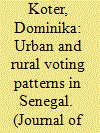| Srl | Item |
| 1 |
ID:
156427


|
|
|
|
|
| Summary/Abstract |
The distribution of material benefits to voters at election time is a widespread practice that raises the cost of campaigning and is on the increase across Africa. This article examines the consequences of the high cost of campaigning in African democracies. It argues that the prevalence of gift giving and vote buying affects parties’ selection of candidates by privileging wealthy candidates and pushing out qualified, but less-endowed candidates. This argument is supported with original data on the backgrounds of Members of Parliament from six legislatures in Benin, a successful African democracy. It shows that the number of wealthy candidates has increased substantially since the introduction of multi-party politics 26 years ago and that this trend has important implications for the quality of democracy. Using data on MP performance, the article shows that along some important indicators, wealthy candidates perform worse in office than other MPs. These findings indicate that the consequences of electoral handouts to voters are much more far-reaching than previously thought.
|
|
|
|
|
|
|
|
|
|
|
|
|
|
|
|
| 2 |
ID:
119690


|
|
|
|
|
| Publication |
2013.
|
| Summary/Abstract |
Much of the literature on electoral politics in Africa has focused on one mechanism of electoral mobilization reliance on shared ethnic identity between politicians and voters. On the contrary, the author argues that politicians pursue two distinct modes of nonprogrammatic electoral mobilization: (1) by directly relying on the support of voters from one's own ethnic background, and (2) by indirectly working through electoral intermediaries-local leaders who command moral authority, control resources, and can influence the electoral behavior of their dependents. Yet the power of local leaders varies greatly; hence the option to use electoral intermediaries is not available in all settings. The choice of electoral mobilization affects national electoral outcomes: by severing the direct link between politicians and voters, intermediaries reduce a campaign's reliance on shared identity and create cross-ethnic electorates. The evidence for this argument is based on original interviews with political leaders collected during fieldwork in Senegal and Benin during the 2006-7 electoral season, media coverage of elections, and a historical analysis of first mass elections in the 1950s.
|
|
|
|
|
|
|
|
|
|
|
|
|
|
|
|
| 3 |
ID:
168835


|
|
|
|
|
| Summary/Abstract |
Does the ethnic identity of a country’s leader have an effect on citizens’ national identity? This question is particularly relevant in ethnically diverse states in Africa where national identity is commonly regarded as underdeveloped and ethnic divisions are socially salient. I argue that citizens’ national attachment is affected by the ethnic origin of their countries’ presidents. Using cross-country data from the Afrobarometer on levels of national attachment over time, combined with data on leaders’ ethnicities, I show that following a presidential transition national identification among the new presidents’ coethnics increases relative to that of non-coethnics.
|
|
|
|
|
|
|
|
|
|
|
|
|
|
|
|
| 4 |
ID:
124261


|
|
|
|
|
| Publication |
2013.
|
| Summary/Abstract |
One of the most striking voting patterns in many African elections is the marked difference between urban and rural voters in their willingness to support the incumbent. In many countries, incumbents receive their worst electoral scores in the cities, whereas the countryside votes overwhelmingly for them. This pattern is puzzling because there is no evidence that rural areas benefit more from government policies. On the contrary, most governments in Africa exhibit a pro-urban policy bias. Why then do rural voters support incumbents at higher rates? Using evidence from original interviews with politicians in Senegal, coupled with media coverage from several elections, I contend that incumbents enjoy higher success in rural vis-à-vis urban areas because rural voters are more susceptible to clientelism. Tight social structure, cohesion and the prominent role of local patrons facilitate the acquisition of entire blocs of rural voters for the incumbent. These findings are independent of ethnic, religious or party identity.
|
|
|
|
|
|
|
|
|
|
|
|
|
|
|
|